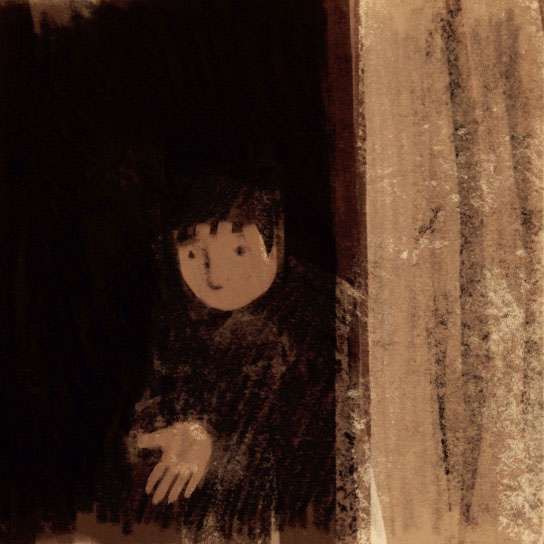No outro dia, um jovem vendedor da Cais parou-me na rua pela segunda vez em quinze dias. Tal como da primeira vez, não queria que eu comprasse a revista. Também não queria uma moeda. Queria, em vez disso, que eu fosse com ele a uma farmácia para comprar leite em fórmula. Disse me que tinha um filho bebé que precisava de uma fórmula muito especial porque era uma criança doente, que não tolerava leite normal. Insistiu em que não queria uma moeda, quando eu tentei dar-lha. Disse-me que não valia a pena… e abanou o bolso vazio do colete da Cais. O que ele precisava era do leite, não de moedas. Segundo ele, os vendedores da Cais só conseguem vender alguns exemplares da revista no início de cada mês, e mais nada.
A boca dele não tinha um dente, só cepos pretos nas gengivas. Disse-me que tinha 24 anos e 5 filhos.
Nesse momento, eu lutava internamente com as possibilidades e as dúvidas. Estava ele a aldrabar-me? Se lhe comprasse uma lata de leite em pó, iria vendê-la logo? Teria ele realmente cinco filhos? O mais novo estaria mesmo doente?
Por um lado, irritei-me: ele ainda nem tem 25 anos e já 5 filhos, e está a pedir-me dinheiro, porque presume que eu sou rica, por ser estrangeira e ter olhos azuis, e portanto obrigada a dar €20 a qualquer pessoa só porque essa pessoa não toma cuidados na vida. O tipo tem 5 filhos, não tem dentes e quer que eu lhe subsidie a estupidez e a irresponsabilidade?
Por outro lado, tive dó: ele tem 5 filhos, ainda nem sequer tem 25 anos, veio da Romênia aos 16 anos, e é magro como um palito; comer com aqueles cepos em vez de dentes deve ser um agonia. Tem um filho em casa a sofrer, e se isto tudo é verdade, precisa de ajuda, mesmo que as suas decisões tenham sido más, independentemente de onde veio, e sejam quais forem os nossos preconceitos sobre esse sítio.
A menção de um bebé doente comove a maioria das pessoas. A menção de cinco filhos pode levar alguns de entre nós a questionar a moralidade de trazer cinco almas para uma vida de pobreza extrema, mas, se as crianças existem mesmo, são crianças e são inocentes.
“Porque continua a ter filhos?”, perguntei. “A vida é complicada”, respondeu. Embora romeno, já apanhou o jeito português de sugerir que tudo é “complicado”, no sentido de “não vou explicar porque, bem, não vamos falar nisso”. E quem sou eu para julgar? Se calhar adoptou cinco órfãos.
“E quanto custa esse leite de que precisa?” perguntei, enquanto me perguntava a mim própria porque é que ele não podia juntar o dinheiro moeda por moeda.
“Custa €85, e faz parte de um kit, com um creme de que o bebé precisa também.”
O QUÊ????
A tristeza e culpa abandonaram-me de repente, e fiquei novamente irritada: “desculpe, não sei o que possa dizer ou fazer para o ajudar… se faz favor, não me peça outra vez”, e passei à frente, enjoada, cheia de dúvidas de que essas crianças existissem mesmo e que ele as pudesse sustentar a todas, incluindo o tal bebé doente, a vender 20 cópias da Cais por mês.
Nas ruas de todas as cidade do mundo, há pessoas a pedir dinheiro e, claro, Lisboa não é excepção. Na época turística, que agora é o ano todo, ainda há mais, e concentram-se no centro. Lisboa não tem tantos pedintes como outras grandes cidades, mas a sua quota é abundante: sem-abrigos, pessoas com deficiências horrendas, cegos, velhos, bêbedos, drogados, gangues de mulheres com bebés, sempre a dormir ao colo, e os vendedores da Cais, que tentam sobretudo obter uma moedinha em vez de vender a revista.
E o que fazemos nós? Quem, além dos mais ricos, pode sair de casa com os bolsos cheios de moedas para dar a quem precisa? E provavelmente precisam. Como podemos diferenciar entre os que acabam na rua por causa de circunstâncias tremendas e os que lá vão parar devido à bebida ou à droga? Por uma razão qualquer, estão na rua, a pedir, e nós não sabemos o porquê. Imagine a indignidade de ter de pedir. Seja por que razão. Mesmo que nos estejam a aldrabar… pelo menos em escala pequena.
Suspeito de que a maioria de nós passa por essa luta interna de cada vez que sai à rua e passa por uma pessoa a pedir dinheiro. Ou não?
A luta dentro de nós é ironicamente mais visível quando encontramos cegos a pedir no Metro. Eles não nos podem ver as caras, nem o alívio pelo facto de não precisarmos de lhes dizer “não”, quando nos escondemos em silêncio para não lhes dar nada. Eles não podem ver a centelha de culpa que passa nos nossos olhos por não lhes termos dado uma moeda, ou o constrangimento que sentimos quando, ao contrário, lhes damos uma moeda… e a carruagem toda fica a olhar para nós, cada pessoa com a sua opinião. Há os que seguem a política rigorosa de nunca dar nada, mas isso não significa certamente que não tenham a tal luta dentro deles, perante o facto de haver quem precise de pedir.
Damos o que podemos? Ou não?
(traduzido do original inglês pela autora)
Begging questions
The other day, I was stopped in the street for the second time in a fortnight by the same young man selling Cais (the Portuguese equivalent of The Big Issue). Just like the first time we met, he didn’t want me to buy the magazine. He didn’t want a coin. He wanted me to go with him to a chemist to buy milk powder. He told me that his baby needed special formula milk, because he was a very susceptible child and couldn’t tolerate anything else. The guy was insistent that he didn’t want a coin I was trying to give him. He said it was pointless… and jangled the empty pocket of his Cais waistcoat, he needed the milk, he said, not the money. He said that he and other Cais sellers only sell a few copies of the magazine at the beginning of each month.
He didn’t have a tooth left in his mouth, apart from black stumps. He was 24. He told me he had five children.
At this point, I was struggling with all possibilities. I was plunged into doubt. Is he scamming me? If I were to buy him a tin of milk powder, would he sell it to someone? Does he really have five children? Is the youngest of them sick?
I was annoyed. He has five children by the age of twenty four and he is asking me, because of his assumption that, because I am blue-eyed and foreign, I must surely be rich enough to hand over €20 to anyone who asks me to buy expensive milk for his lack of care. He has five children by the age of 24, with not a tooth in his head and he wants me to subsidise his stupidity and carelessness?
I was sad. He has five children, he is 24 and he came from Romania when he was 16, he is as thin as a stick and eating on those painful black stumps of teeth must be agony. He has a child at home who is suffering, and if all this is true, he is in dire need of help, whatever his bad decisions, wherever he came from and all of our prejudices about that place.
At the mention of a sick child, most of us are reachable. At the mention of five children, some of us start to question the morality of bringing five souls into extreme poverty, but still, if they do exist, they are children, they are the innocent parties.
“Why do you keep having more children?” I asked him. “Life is very complicated”, he said. Although he was Romanian, he had already assumed the Portuguese euphemism of “it’s complicated” for “I’m not explaining that in detail, because, well, let’s not go there”. And hey, what do I know about why he has 5 children? Maybe he has taken in five orphans, I don’t know, so who am I to judge?
“How much is this milk?” I asked, wondering why he couldn’t just keep collecting coins to reach that amount.
“It’s 85€, it comes as part of a kit, with some special cream that the baby needs as well.”
WHAT???
The sadness and guilt I was feeling dissipated rapidly, and I was annoyed again. “sorry, I don’t know what else I can say and I can’t help you… and please, don’t ask me again” I said, and I left, feeling sick with doubt, wondering if maybe it was all true, wondering if those five poor children really existed, wondering how this man can hope to sustain them with his 20 or so copies of Cais that he sells per month.
On the streets of any city in the world, there are people asking for money and, of course, Lisbon is no exception. In tourist season, now all year round, there are more, and they are concentrated in the centre of the city. There are not that many, compared to some cities in the world but Lisbon has her share of people begging…. her homeless, her people with terrible disabilities, her blind, her old, her drunks, her junkies, her small gangs of women with suspiciously sleepy babies and, more and more, her Cais sellers who are just asking for any coin that you can spare, instead of the sale of a magazine.
So, what do we all do? Who, apart from the richest of the rich can leave the house with pockets full of coins to give to everyone we meet who is in need?
And in need they all are. How can we differentiate between those who have arrived on the streets because of dire circumstances and those who have drugged or drunk themselves to get to that point? For whatever reason, they have ended up in need and we don’t know why. Imagine the indignity that it is to end up having to beg for money. However someone ends up in that position. Even if they are scamming us… on a small scale.
I think most of us struggle with all this each time we leave the house, each time we pass someone asking for money, don’t we?
The struggle in us, ironically, is most visible when we find the blind asking for coins on the metro. They cannot see the faces of we fellow travellers, the relief that we haven’t had to say no to them, when we just hid, silently, not giving. They can’t see the fleeting guilt that passes across our faces when we don’t give, or the embarrassment that some feel when we do give… the whole metro carriage is watching, and everyone has an opinion about giving money to beggars. Some people have a rigorous no-giving policy, but it doesn’t mean that they’re not torn, sickened by the fact that people are in enough need to resort to begging.
Do we give what we can whenever we can? Or do we not?












